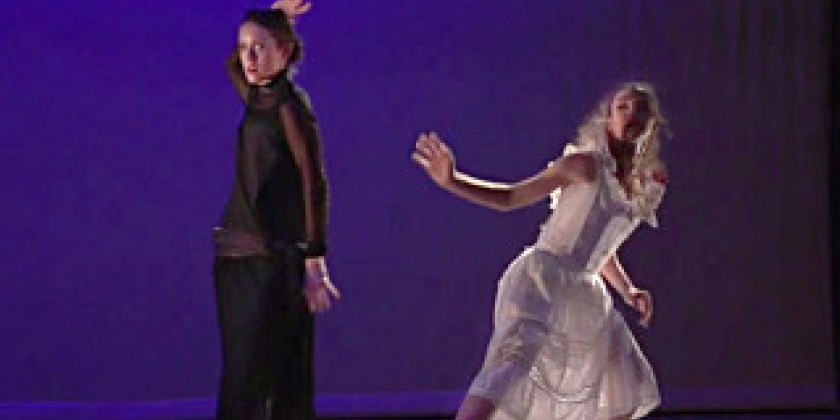THE DEBORAH ZALL PROJECT: IN THE COMPANY OF WOMEN

Company:
Classic Contemporary Dance Heritage
"THE DEBORAH ZALL PROJECT: IN THE COMPANY OF WOMEN" HAS FULL PRODUCTION MAY 13 AND 14 AT MARTHA GRAHAM STUDIO THEATER IN WESTBETH
Deborah Zall, a former stalwart of the Martha Graham family, returns with dramatic portrayals of women characters that she had "left the Graham fold" to pursue.
WHERE AND WHEN
May 13 and 14, 2016 at 8:00 PM
Martha Graham Studio Theater at Westbeth, 55 Bethune Street, 11 fl.
Presented by Classic Contemporary Dance Heritage Ltd.
$30 gen. adm., $15 seniors and students
Box office: SMARTTIX (212) 868-4444, www.smarttix.com
Show website: www.deborahzall.com
Runs 1:25. Critics are invited to both performances
NEW YORK -- Deborah Zall (www.deborahzall.com) left the Martha Graham fold to pursue an independent career as a soloist, creating dramatic portrayals of women that are based primarily on works of dramatic literature. Her signature pieces include dances inspired by female characters drawn from Eugene O'Neill, Edna St. Vincent Millay, Tennessee Williams and F. Garcia Lorca. Last year, she was convinced to re-stage six of her classic female solos for past and present Martha Graham Dance Company members. The resulting evening, titled "The Deborah Zall Project: In the Company for Women," was mounted as an informal presentation in the Martha Graham Studio Theater in Westbeth. It proved so sensational that Ms. Zall was pressed to remount the evening this year as a full production. This time, it'll be done with four of her own pieces plus two complimentary works drawn from the Anna Sokolow Company. The concert will bear the same name and will be presented May 13 and 14, again at the Martha Graham Studio Theater, by Zall's nonprofit company, Classic Contemporary Dance Heritage Ltd.
Zall sees herself as largely an artistic descendant of Graham, but her interests have ranged toward the literary. Her main works focus on the mental journeys of "falling women" characters of great dramatic works. In her "Mary Tyrone," set to music of Schoenberg, the mother character of O'Neill's "Long Day's Journey into Night" confronts her drug addiction, weighing whether to take a fix of morphine. In "Amanda," inspired by "The Glass Menagerie," the mother character studies herself in a mirror, comparing the woman she sees to the belle she was, popular and besieged by gentlemen callers. In "Sonnet," based on a poem by Edna St. Vincent Millay, a woman struggles to forget a lost lover. In a piece devoted to George Sand, the author reflects on having always been an artist, for better or for worse. "Shadow of a Sister," drawn from Lorca's "The House of Bernarda Alba," examines two of the play's five sisters in a dance about their clash of wills.
The request to remount these works originally came from three Graham Company members, past and present--Blakely White McGuire, Kim Jones and Nya Jones--who asked if Zall would consider re-staging her solos for them. A bit overwhelmed but flattered, she thought, "Why not?" Adding Jennifer Conley, Erica Dankmeyer and Carrie Ellmore Tallitsch to the ensemble, she set about to see the reaction to old fashioned dramatic narrative solos.
It was a revelation to Zall that a new generation of Graham artists would want to perform her work. It's also extraordinary, she says, for her to return to the Graham conclave with the very works she had once left it behind for. She had taught Graham technique there and these techniques are strong in her work. "Old fashioned emotion is not wrong," she asserts. "They see the blood of Martha in these dances." Still, it was unexpected to be ratified so strongly for her vision by a new generation of the Graham family. Zall says, "To keep archival works alive is very important because you learn from the past. It brings you to the present and we mustn't invalidate it." She adds, "The excitement for me is how people are reacting. The reality, I guess, is that truth is still popular and women's issues are still part of the world."
The dances had proved their ability to communicate through the years in real-world, nontraditional venues. Zall performed her Mary Tyrone piece in real-life drug rehab centers in the 1970s. Patients there would laugh and cry. Works on other women's tragedies resonated strongly with women in various other types of institutions, like homeless shelters and Rikers and Bayview prisons.
Reviewing last year's program, Joel Benjamin (TheaterScene.net) wrote, "Recently, after years of relative obscurity, she has emerged as an important choreographer, the keeper of the dramatic Graham tradition….Ms. Zall uses the old-fashioned Graham vocabulary well. Bodies actually vibrate from inner pain as the feet thrum against the floor and fists against the heart." Lea Antolini-Lid (Bearnstow Journal) agreed, writing "Some have used the term 'old fashion' to describe the works of Ms. Zall, but the impact and the power presented in these historical dance pieces is anything but old fashion." She concluded, "I would like to see more of Zall's work and would recommend all professors take their theater and dance students to see these great works of art." Broadway World (Samantha Bancroft) added, "Once seen as an ancient art, Deborah Zall's works will indeed live on and continue to influence dancers everywhere."
Two of this concert's six dances showcase members of the Anna Sokolow Company; their presence in this concert is an homage by Ms. Zall to Ms. Sokolow, who created for Ms. Zall one of her greatest signature pieces, "Kaddish" (which Zall then built upon into "Kaddish for Ten Women"). Zall says it is hard to overestimate the importance of Sokolow to her; she wanted to have Sokolow dances represented as a tribute.
PROGRAM
"Amanda," choreographed by Deborah Zall, inspired by "The Glass Menagerie" by Tennessee Williams. Original music by Stephen Weinstock. Performed by Erica Dankmeyer. (10 min)
"Sonnet," choreographed by Deborah Zall, based on "Sonnet II" by Edna St. Vincent Millay. Original music by Eugene Lester, Poem spoken by Geraldine Johns. Danced by Jennifer Conley. (10 min)
"George Sand," an excerpt from "Labonne Dame: Remembering George Sand" (1998), choreographed by Deborah Zall, text created by Mary Humphrey Baldridge, narrated by Geraldine Johns. Danced by Erica Dankmeyer. Music by Chopin. (7 min)
"September Sonnet," choreographed by Anna Sokolow, danced by Lauren Neslund and Luis Gabriel Zaragove to music by Alban Berg. (10 min)
Intermission (15 min)
Excerpt from "Lyric Suite" choreographed Anna Sokolow, danced by Jennifer Conley (10 min)
"Shadow of her Sister" choreographed by Deborah Zall, based on F. Garcia Lorca's "The House of Bernarda Alba," performed by Lauren Newman as Angustius and Dani Stinger as Adela. Music by Robert H. Waldman. (15 min)
ABOUT DEBORAH ZALL
As guest artist, Miss Zall performed at the Edinburgh Festival in Scotland, Cannes Festival and Biennial de la Dance in France, Contempo Tanz in Guatemala, South Bank Center, The Place in London and Jacob’s Pillow Dance Festival in Massachusetts. In addition to her own choreography, Miss Zall’s repertory includes works created especially for her by Jane Dudley, Stuart Hodes, Igal Perry and Eleo Pomare. Her unique talents have prompted several renowned choreographers to reconstruct solo works for her and she has been critically acclaimed for her performances of Ruth St. Denis’s "Incense," "Brahms-Liebestraum" and "Gold Madonna" (reconstructed by Jane Sherman); Jane Dudley’s "The Lonely Ones" (character "Revenge is Sweet"); Sophie Maslow’s "The Village I Knew" (character the "Yente"); Anna Sokolow’s "Kaddish"; Ethel Winter’s "En Dolor"; Yuriko’s "The Cry"; and "Proverbs" by Jane Dudley, choreographed especially for Miss Zall and Bertram Ross, as well as Martha Graham’s classic work "Lamentation."
A grant from the National Endowment for the Arts facilitated Miss Zall’s creation of two works for the Los Angeles Ballet: "Preludes" and "Souvenirs," said to be a "most valuable company resource," and "Pastorale," hailed at its premiere performance in Los Angeles as "the choreographic highlight" of the program (Lewis Segal, L.A.Times). A grant from the Arkansas Council of the Arts and Humanities enabled her to choreograph "Espaniana" for the Arkansas Ballet in Little Rock, and this work was subsequently performed by the Harkness Dance Players at Watch Hill, Rhode Island. In addition, "Cathedral Reflections," created for the Harkness Dance Players, premiered at Hunter College Playhouse in New York, toured the East Coast and was subsequently re-staged for The Repertory Dancers of New Jersey. She restaged Bertram Ross’ work "Nocturne" for the Martha Graham Dance Ensemble and the Ailey/Fordham Dancers. She assisted Yuriko in restaging "Steps in the Street," excerpted from Martha Graham’s "Chronicles." Miss Zall’s works have been filmed for telecast by CBS-TV, PBS, and the BBC, London. Her works are in the permanent collection of the New York Public Library for the Performing Arts, Neighborhood Playhouse School of the Theatre, Barnard College, and the Dance Library of Israel. Funding received from National Endowment for the Arts, Grand Marnier, Harkness Foundation for Dance and the Jerome Robbins Foundation.
Miss Zall has been on the faculties of the High School of Performing Arts and the Martha Graham School in New York, City University of New York, University of California at Los Angeles, Harkness House, and the Neighborhood Playhouse School of the Theatre in New York. She has taught as a guest instructor at the California Institute of the Arts, Centre de la Dance in Cannes, France, and has been Artist-in-Residence at Smith College, and Performance Artist for the Lincoln Center Institute. She is currently teaching workshops nation-wide in the United States and internationally, and has recently taught at Middlesex University, Laban Centre, and The Place in London.
Her mentor and great friend, Bertram Ross, gave her the legacy of his works, which she makes available for restaging.
Share Your Audience Review. Your Words Are Valuable to Dance.
Are you going to see this show, or have you seen it? Share "your" review here on The Dance Enthusiast. Your words are valuable. They help artists, educate audiences, and support the dance field in general. There is no need to be a professional critic. Just click through to our Audience Review Section and you will have the option to write free-form, or answer our helpful Enthusiast Review Questionnaire, or if you feel creative, even write a haiku review. So join the conversation.



